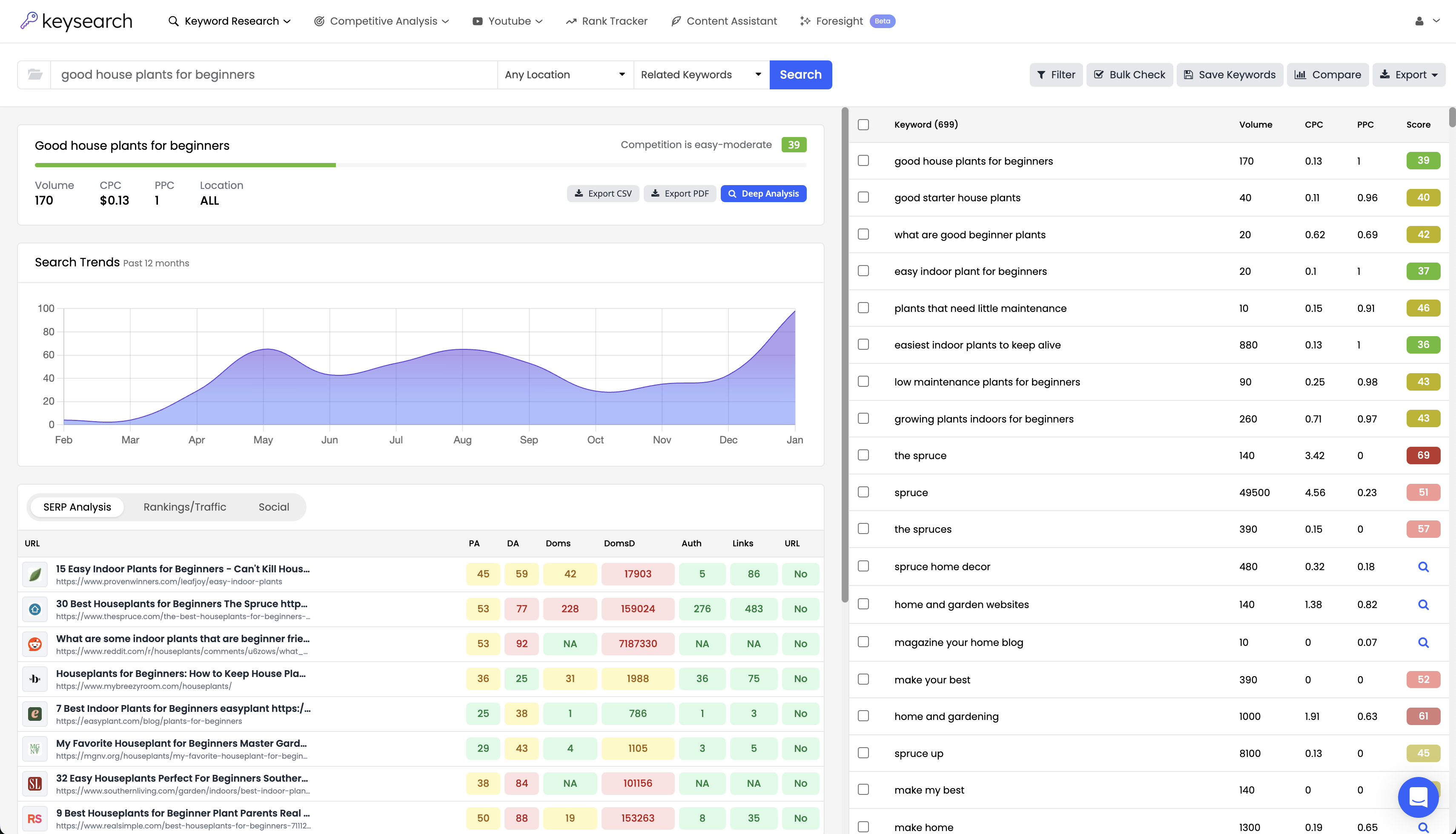Once you’ve mastered the basics of keyword research you can start to take things further with more advanced keyword research techniques. There are so many unique strategies you can use to uncover opportunities that you’d otherwise never know existed.
We’ll share some of our personal favorites below, like stealing your competitor’s entire SEO strategy in just a few clicks, using your existing analytics to find low-hanging fruit, and more.
You’ll also learn advanced tips and strategies for keyword research and execution, like keyword grouping, difficulty filtering, and much, much more. But to make the most of these advanced keyword research SEO tips, you need to set yourself up for success with the right tools.
Look no further than Keysearch. Our affordable keyword research tool actually features an entire suite of free SEO tools that make finding your top keywords brain-dead easy – and perhaps more importantly, cost-effective. See for yourself what Keysearch can do today.
The Basics of Keyword Research
We know you’re eager to get into some of our advanced keyword research techniques, but you need to learn how to walk before you can run. Understanding the basic keyword SEO metrics and how to find niche keywords in general is an important first step.
We have a detailed keyword research checklist that covers the basics for you, but what exactly is keyword research in the first place?
What is Keyword Research?
Let’s start all the way from the beginning. Keywords are just the phrases users plug into the search bar when they’re trying to find something. In this sense, keyword research involves a variety of strategies you can use to figure out exactly which keywords will bring the ideal users to your website, or maybe your Amazon listing or YouTube channel.
Keywords can be used to find information, products, or services online. Being able to match intent is what earns you high rankings and brings in traffic on autopilot – more on that later.
At its simplest, keyword research starts with seed keywords – the primary terms directly related to your niche. For example, if you run a weightlifting blog, terms like “strength training plans” or “eating for muscle growth” could be good seeds.
Then, you’d plug these into a keyword research tool to find more specific, long-tail variations and other related keywords.
Types of Keywords
There are three types of keywords you need to know about for this guide on more advanced keyword research SEO tips:
- Short-tail keywords: Broad terms with high search volume, such as “shoes.” They have high search volume but tend to have just as high competition. They’re really broad, too.
- Long-tail keywords: Specific phrases like “comfortable running shoes for flat feet” have lower search volume but difficulty is lower as well. They have more specific intent, so they’re easier to rank for and more likely to convert. Learn about long tail keyword benefits in our blog.
- LSI keywords (Latent Semantic Indexing): These are related terms and phrases that add context to your content, helping search engines understand its relevance.
Your strategy will involve using all these types of keywords, but mainly focusing on long-tail variations – especially at first while you build up your website’s authority. Learn more about long tail keywords vs short tail and where to include long-tail keywords in website in our blog.
Why Effective Keyword Research Matters
Without effective keyword research you run the risk of creating content that no one searches for, wasting time and effort. On the other hand, a solid strategy helps you create content that aligns with user intent, increases visibility, and drives meaningful traffic.
The goal is simple at this stage: generate a list of relevant keywords and organize them by intent and opportunity. This sets the groundwork for more advanced strategies, like clustering, competitor analysis, and long-tail keyword optimization.
That being said, let’s get into some of our advanced tips and strategies for keyword research.
Advanced Keyword Research Techniques to Try
Ready to take things up a notch with more advanced keyword research techniques? While the basics will get your foot in the door with Google, it often takes more to crack the first page and get your website ranking in the top spots where the real traffic comes from.
So, try some of these advanced research SEO techniques and see how easily you can dominate your niche when you do more than just the bare minimum!
Using Competitor Analysis for Keyword Discovery
The easiest way to automate keyword research is by using your competitors’ hard work. The sites in your niche that rank well have already done the heavy lifting for you, so just steal their keyword targeting and mirror it on your own website!
You can pull their entire website architecture or get more granular with an individual page analysis. Either way, plug the URL into our tool here at Keysearch and you’ll extract all the keywords they rank for.
Grouping Keywords Based on Intent
We touched on keyword intent a bit already, but it’s one of the most important fundamentals in all of SEO. If you try to rank a keyword using the wrong type of page, you’ll end up spinning your tires and wasting resources.
This is why you need to group keywords based on intent – informational, navigational, transactional, or commercial.
For example, you’d create blog posts for informational keywords like “what is digital marketing,” and landing pages for transactional queries such as “buy digital marketing software.”
Trying to rank a blog post for “digital marketing software,” wouldn’t make sense, nor would trying to rank a product page for “what is digital marketing.”
Search engines like Google have gotten pretty good at figuring out what users need when searching for a keyword, and matching that intent.
The best way to group keywords based on intent is a tool that does it for you. Otherwise, you can just type in your keyword and see what types of pages rank.
Exploring SERP Features for Hidden Opportunities
Google’s SERP features (search engine results pages) offer a sea of opportunities to inspire keyword ideas that traditional research tools miss.
You can enter your seed keyword into Google and look at the People Also Ask, featured snippets, and image carousels for ideas. Or, you can use keyword research tools that highlight SERP features for your niche as a way to uncover secondary keywords.
Focusing on Lower Competition and Relevance Instead of High Volume
Beginner SEOs are notorious for focusing primarily on search volume. It makes sense on the surface, as more search volume means more traffic, and that would appear to translate into more conversions.
It doesn’t always go that way, though. As we said earlier, higher search volume is almost always accompanied by more difficulty. If the pages ranking for a term have higher domain authority, there’s no point in wasting your time or resources.
So, what is a good keyword difficulty score to shoot for? It will depend on your own site’s authority, of course, but anything less than 30 is good to focus on at first.
We have tips on how to check keyword difficulty in our blog, but really, it’s as simple as using our keyword difficulty checker. You can filter based on keywords that meet your difficulty criteria.
Beyond difficulty make sure you’re targeting relevant keywords that will bring in the right users. What’s the point of ranking for “best running shoes for flat feet” if you sell weightlifting shoes?
Mining Keywords From Social Media Trends and Forums
Most SEOs look for keywords on Google or through SEO tools. That means everyone in your niche is pulling the same ideas from the same places. Step outside the box by finding keywords through other sources, like social media!
Twitter, TikTok, Reddit, and Quora are treasure troves of emerging topics and trends. Monitor hashtags, trending topics, and community discussions to discover keywords gaining popularity.
An added bonus here is you get to see how real users in your niche talk, their pain points, and the solutions they crave. From there you can create content or products that better resonate.
Utilizing Question-Based Keyword Tools
There are SEO tools specifically dedicated to question-based keywords, like AnswerThePublic. Or, you can just filter your keyword research tool to bring in only question-based keywords.
Either way, these are going to be some of the more lucrative long-tail variations you can pull for your website. You know people are searching these questions, so create content that answers fully and directly and watch your organic traffic soar.
Leveraging Site-Specific Search Operators
If you don’t have access to a tool like Keysearch (first of all, why not? It’s free!), there’s another way you can conduct competitor analysis to siphon your rivals’ traffic: site-specific search operators.
This is the manual way to analyze competitor keywords. You can plug in “site:example.com [keyword]” to reveal what topics competitors or industry leaders cover.
Exploring Paid Ad Keywords for Organic Potential
Paid advertising and SEO go hand-in-hand. If you’re generating sales through a keyword in your PPC campaign, there’s a good chance it’ll bring even more value if you can rank for it organically.
Platforms like Google Ads allow you to analyze keyword performance metrics such as cost-per-click (CPC) and click-through rate (CTR). Keywords with high engagement in ads typically indicate strong search intent.
Discovering Seasonal and Event-Driven Keywords
Google Trends is one of the best free keyword tools in the world. You can effortlessly identify patterns in search volume around holidays, annual events, or product launches.
Then, just create content ahead of these peaks to position your site ahead of the competition so you can capture traffic when demand is highest.
Digging Into Analytics to See What Real Users Search For
Whether you’re ranking keywords on Google or some other search engine, use that existing data to your advantage. Tools like Google Analytics and Search Console reveal terms users are already using to find your site.
You might be ranking for terms (albeit really poorly) that you aren’t even trying to target. Actually creating pages that attempt to rank for these keywords is one of the most advanced keyword research techniques that’s entirely free.
Don’t Overlook LSI Keywords!
Last but not least on our list of advanced keyword research SEO tips, make sure you’re incorporating LSI keywords into your strategy. As we touched on already, these are related terms and phrases that enhance the context of your content.
It’s as simple as using our LSI keyword tool, or, you can look at the bottom of the SERPs to see what related queries Google suggests. Learn more about LSI vs long-tail keywords in our blog.
Put These Advanced Tips and Strategies for Keyword Research into Practice With Keysearch Today!
There are so many powerful advanced keyword research techniques you can add to your repertoire, these are just a few we go back to in our own strategies.
Now, you can go ahead and learn what to do after keyword research to get the ball rolling on your campaign – or, you can go back to the drawing board and put these advanced tips and strategies for keyword research into practice with Keysearch!
Our all-in-one SEO toolkit is trusted by tens of thousands of users with hundreds of glowing endorsements from leading professionals at Raptive, Shopify, Ezoic, and more. We’ve touched on some of our tools already, but here are some others we didn’t mention yet:
- Niche finder
- Free keyword grouping tool
- Keyword density tool
- Duplicate content checker
- Robots.txt generator
- Free long tail keyword tool
- SERP simulator
We’re constantly building the latest and greatest tool, so your SEO arsenal is only going to get better with time. We pull real-time data from the most reputable sources so you can rest assured you’re making the most calculated decisions possible.
You can also pull insights from specific platforms with our Amazon keyword tool, Pinterest keyword tool, Etsy keyword generator, keyword generator for YouTube, or eBay keyword tool.
The best part is Keysearch is free to start with and even our paid plans are more affordable than the competition. So, why not put these advanced keyword research techniques to the test today? Hit the ground running with Keysearch and see how much simpler SEO can be.
Wrapping Up Our List of Advanced Keyword Research SEO Tips
That concludes our guide to the most advanced tips and strategies for keyword research. While basic strategies are a great starting point, these methods will give you an edge over the competition.
Find more SEO resources in our blog, including how to do YouTube keyword research, how to improve Etsy SEO, does keyword density matter anymore, how to use keywords on YouTube, how to do Amazon keyword research, how to do Pinterest keyword research, how to track keywords for YouTube, how to do Etsy keyword research, or how to check keyword density.
You can also take a look at these comparison posts to see what makes Keysearch the most trusted tool at your disposal:
As you’ll discover once you start using it, though, Keysearch is the best way to implement these more advanced keyword research SEO tips. Unlock powerful keyword insights to elevate your SEO game today!
- How to Do Keyword Research for Free: Best Free Keyword Research Tools in 2024 - December 13, 2024
- Benefits of Keyword Clustering: Why is it Important to Group Relevant Keywords Together? - December 13, 2024
- What is Keyword Density in SEO and Its Importance - December 13, 2024







